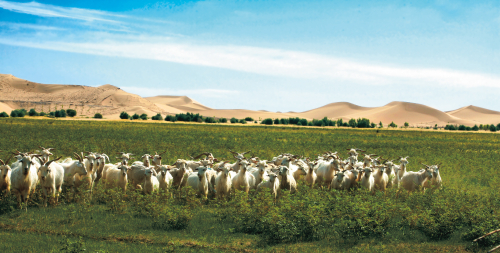 |
|
GRAZE EXPECTATIONS: Formerly barren Hobq Desert has been transformed into a fertile grassland (COURTESY OF KUBUQI ECO-CIVILIZATION ENTREPRENEURS ANNUAL CONFERENCE) |
Located southwest of the Inner Mongolia Autonomous Region, the Hobq Desert has become in two decades a symbol of the fight against desertification in China and a meeting place for people interested in the subject. The Hobq International Conference Center is the traditional venue of the biennial Hobq International Desert Forum launched in 2007, and other important meetings such as this year's Eco-civilization Entrepreneurs' Annual Conference, which was primarily aimed at creating synergy among Chinese private companies that can play a role in desertification control.
All these events were mainly initiated by the Elion Resources Group, a private Chinese company in Inner Mongolia. Since the mid-1990s, the group has been working with the regional government and locals to create a giant ecological shield in the Hobq Desert. Under the leadership of its founder Wang Wenbiao, Elion has created a desertification control model with Chinese characteristics. The Hobq Model is based on available desert resources and supported by technological innovation. Its enterprise development is driven by science and technology and its large-scale desertification control is driven by industry.
With assets exceeding 100 billion yuan ($16 billion), Elion has become a key national enterprise. While the desert economy, clean energy and natural pharmaceutical products are its core industries, it is embracing new sectors and cultural tourism-related industries as well.
Green renaissance
The 18,000-square-km desert is the seventh largest in China. Land degradation started more than 2,000 years ago due to the very dry climate, wars and over-exploitation of land. The grasslands became covered with sand, bringing misery to the area's nomadic inhabitants.
Wang spent his childhood in a village on the outskirts of the Hobq Desert. For him, the sand was synonymous with pain. "I grew up eating meals with sand, and sleeping on a sand-covered bed," he said. Necessity, not choice, dictated the transformation. Though the nearest railway station lay only some 60 km away from the salt pan, the lack of roads in the desert and regular sandstorms made transportation costs go up. Most of the profit was spent in finding a way out of the desert.
The launch of a project to build the first road in the desert in 1997 with the local government's support marked the beginning of the battle against desertification in the Hobq. After the road became operational in 1999, the company realized the need for a protective barrier to prevent the sand from covering it. In this way, the afforestation program was born. At that time, the key question was what trees to plant and what technical measures to implement. Monoculture or a bad choice of plants could be catastrophic in such an environment. In the early days of the project, the drought-enduring trees planted by Elion did not survive, despite several attempts.
It made Wang realize the importance of working in cooperation with the local people and using science to develop a suitable model. After several failed attempts, the company eventually discovered that licorice was the best choice for the Hobq Desert. This very strong herb has proven to be a useful tool in sand dune stabilization. Research conducted with various Chinese and foreign research centers helped to broaden the range of harvestable plants and diversify cultivation methods.
Besides licorice, sand willows and poplars were also planted along the road network. A major advantage was that the Hobq still has water tables a few meters from the ground surface. According to Elion officials, the afforested area now covers more than 6,000 square km. In less than a decade, a company previously regarded as causing pollution has become eco-friendly, transforming an area once considered worthless into a real gem.
Elion's kingdom
Within a quarter century, the Hobq Desert has evolved into an oasis housing three huge areas dedicated to industry, agriculture and tourism. Each area has imposing gates at the entrance with solar panels along the roads. Besides the huge operating plants in the industrial zone, there are greenhouses and laboratories dedicated to cultivation and research. In addition, there is the Eastern Elion School, built in 2009 to provide a good education to some 1,300 students.
